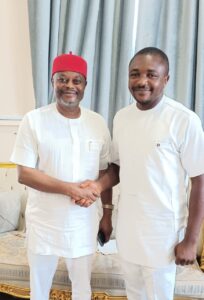Chief Uche Nnaji: Transforming Nigeria’s Ministry of Innovation, Science and Technology
By Udeh Abuchi (Jbeeudeh)
Since his appointment by President Bola Ahmed Tinubu on 16 August 2023 as the Minister of Innovation, Science and Technology, Chief Uche Geoffrey Nnaji has steered Nigeria’s science, technology, and innovation (STI) agenda with fresh energy, renewed vision, and focused programs. His leadership is reorienting the ministry from rhetoric to results, with significant strides in aligning STI to national development goals, industrialization, job creation, technology commercialization, and economic diversification. Here is how he has transformed the ministry and what his impact has been so far.
—
A Vision Rooted in National Renewal
Chief Uche Nnaji entered office at a time when Nigeria seeks to deepen innovation as a pillar of its economic renewal agenda. Under his watch:
The ministry has emphasized the Renewed Hope Agenda of the Tinubu administration, pushing for economic diversification, digitization, local manufacturing, and reduced reliance on imports.
There is a renewed focus on aligning the ministry’s interventions with the Presidential Priorities, using tools like a Performance Management System (PMS), improved stakeholder collaboration, and clearer strategic deliverables.
—
Key Initiatives and Strategic Moves
Here are some of the specific actions, programs, and strategies introduced or accelerated under Minister Nnaji’s watch:
1. Technology & Innovation Expo
The Ministry has organized Technology Innovation Expos (e.g. 2024) aimed at promoting locally made goods, showcasing achievements in science and research, and facilitating partnerships between inventors, innovators, and investors.
The expos are intended to reduce import dependence, enhance revenue generation, and create jobs.
2. Performance and Accountability
Under Nnaji, the ministry has enhanced its Performance Management System to ensure transparency, accountability, and delivery of measurable results.
A sectoral retreat was held in Abuja to refine strategies and align ministry operations with national priorities.
3. Promoting Research-Development-Innovation-Commercialization (RDIC)
At the 22nd National Council on Innovation Science and Technology (NCIST), Nnaji emphasized that prosperity in the modern era is powered by intellectual capacity, research, innovation, and commercialisation—not just raw materials.
He has pushed for more effective linkages between researchers, industry, and government to ensure that innovations move from the lab into real products and services.
4. Economic Growth Through STI
The ministry under Nnaji is driving STI as a tool to address economic challenges—education, unemployment, value chain development—and ensure inclusive growth.
He argues that Nigeria must move from being a consumer economy to a production-driven one.
5. Stakeholder Engagement & Ecosystem Building
Partnership with technopreneurs, public-private actors, academia, and innovators has been strengthened. Innovators are being encouraged to partner with the government for the commercialization of research.
Emphasis on creating awareness of science and technology among the broader populace via expos, public briefings, summits.
6. Intellectual Capacity & Human Capital
Minister Nnaji has underlined that intellectual capacity, R&D, and innovation are the backbone of Nigeria’s future prosperity.
There is recognition that for STI to flourish, Nigeria must invest in scientists, innovators, researchers and create enabling environments for them.
—
Outcomes, Early Impacts, and Challenges
Early Impacts
While it’s still early in his tenure, there are credible signs of progress:
Heightened awareness and mobilization around innovation: The expos and NCIST have drawn attention and participation from key stakeholders.
Sharper focus on measurable deliverables: With PMS and aligned ministerial deliverables, there appears to be more discipline in planning and accountability.
Movement toward import substitution: By promoting local innovation, entrepreneurship, and production, there is momentum toward reducing Nigeria’s dependence on importation.
Key Challenges Remaining
Even with progress, there remain obstacles:
Funding & Infrastructure: Science and innovation require sustained investment in R&D infrastructure, lab facilities, supportive policy, and human resources. The pace of such investment often lags.
Commercialization Gap: Translating research into marketable products remains difficult due to weak private sector linkages, regulatory bottlenecks, and limited access to funding for startups / innovators.
Policy Continuity & Implementation: Ensuring that stated policies and plans are followed through—this includes addressing bureaucracy, corruption, or implementation lapses.
Capacity Building: Nigeria has many bright scientists and innovators, but often lacks sufficient training, mentorship, advanced equipment, and global connections.
Global Competitiveness: To compete as an innovation hub regionally or globally, Nigeria must raise standards, ensure quality, protect intellectual property, and attract investment.
—
Looking Forward: What More Needs to Be Done
To consolidate and deepen the transformation already underway, the following steps are recommended:
1. Increase Budgetary Commitment to STI: More funds, better disbursement, oversight, and targeted investing in core areas (e.g. biotech, AI, renewable energy, space tech).
2. Policy & Regulatory Reforms: Simplify regulations for researchers and startups, strengthen IP protection, remove import barriers for scientific equipment, support incentives for private investment in innovation.
3. Strengthen Research Institutions: Upgrade labs, universities, federal research institutes; ensure they have modern equipment, stable power, good management.
4. Promote Public–Private-Community Partnerships: Encourage collaborations between government, industry, academia, with special attention to tech transfer and commercialization.
5. Support Local Innovation & Tech Entrepreneurship: Provide grants, seed-funding, incubation hubs; streamline business registration and export procedures for tech firms.
6. Focus on Digital Transformation & Skills Development: Build human capital via training in STEM fields, digital literacy, emerging technologies; ensure equitable access across states.
7. Monitoring & Evaluation: Systematic tracking of project outcomes, impact assessments, transparent reporting, adjusting strategies as evidence emerges.
Conclusion
Chief Uche Geoffrey Nnaji has brought dynamic leadership to the Ministry of Innovation, Science and Technology in Nigeria. Under his stewardship, STI is moving from being a side conversation to the center of Nigeria’s development strategy. Through expos, retreats, performance frameworks, and a sharper orientation toward commercialization and local capacity, he is helping recalibrate how science and technology contribute to economic growth, job creation, and national empowerment.
For Nigeria to fully realize its ambitions, the momentum set by Minister Nnaji must be maintained—through sustained investment, strong implementation, strategic partnerships, and a culture that rewards innovation. The promise is real; the work has begun, and the transformation could be profound.



